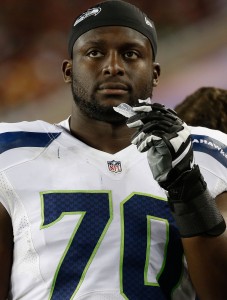Born in Nairobi, Raised for Something Bigger
Rees Odhiambo’s biography begins in Nairobi, Kenya, where he was born on October 23, 1992—far from the bright lights of American football, but destined to reach them.
His mother passed away when he was just seven, a tragedy that could have shaken the foundation of any child. But not Rees. Raised by his father—a man of grit and discipline—Rees learned early how to push through adversity. There were no Friday night lights in Nairobi. No dreams of Super Bowl Sunday. Just a young boy with raw potential and something to prove.
From Nairobi to Texas: A Passport to the Unexpected
Later that same year, Rees and his father moved to the United States, settling in Texas—the heartland of American football. At the time, he had no idea that this move would rewrite his future. And fun fact? He didn’t even start playing football until his junior year at Allen High School. For most NFL players, that’s considered “late.” For Rees, it was just the beginning.
Even with limited experience, coaches immediately noticed his size, strength, and teachable spirit. He wasn’t just big—he was smart, adaptable, and hungry to learn. That hunger led him to a football scholarship from Boise State University, where everything started to change.
Life on the Blue Turf: Boise State & the Rise of a Lineman
Boise State—known for its iconic blue turf—became the perfect stage for Rees to evolve. He redshirted his freshman year in 2011, giving him time to develop and adjust to the collegiate level. Over the next few seasons, he would quietly become one of the most reliable linemen on the Broncos’ roster.
- 30+ career starts across guard and tackle positions

- First-Team All-Mountain West honors in 2015
- Protected elite quarterbacks and became a key part of the Broncos’ offense
But his rise wasn’t without setbacks. In his senior year, Rees suffered a broken ankle—a devastating blow for any athlete. Still, he kept showing up. He rehabbed, studied, supported his team, and prepared quietly for what came next: the 2016 NFL Draft.
From Draft Day Dreams to Sunday Lights: Rees Joins the NFL
In 2016, the moment arrived. The Seattle Seahawks selected Rees in the third round, 97th overall. For a kid who didn’t know what a first down was until high school, it was a massive leap.
Rees entered the league with something to prove. And Seattle—a city known for its grit and relentless work ethic—fit him perfectly. In his rookie season, he played across the offensive line. By 2017, he was making his first career starts, protecting Russell Wilson and holding the line against elite NFL defenses.
Then Came the League Shuffle
As is often the case in the NFL, things changed quickly. Injuries. Depth charts. Coaching shifts. Between 2018 and 2019, Rees spent time with:
- Indianapolis Colts (2018)
- Atlanta Falcons (2018)
- Arizona Cardinals (2018–2019)
Each team gave him a new system to learn, a new challenge to take on. And through it all, Rees stayed ready—training, studying, and showing up with the same quiet strength that had carried him from Nairobi to the NFL.
But what happens when the field isn’t just physical—but emotional and cultural too? Up next, we look at the challenges, cultural impact, and the legacy Rees leaves behind for African athletes chasing dreams on a global stage.
Challenges, Culture, and Quiet Impact
When Rees Odhiambo suited up for NFL games, he wasn’t just wearing a jersey—he was carrying a flag. Not literally, of course. But every time he stepped onto the field, he brought a part of Kenya with him. And for many watching—especially in the African diaspora—that mattered more than stats or headlines ever could.
But let’s be honest: Rees’s path wasn’t easy. Not even close.
Injury: The Uninvited Teammate
Injuries were a recurring opponent in Rees’s career. Starting with that broken ankle at Boise State and continuing through his time in the NFL, setbacks like these forced him to sit out when all he wanted was to play. Every injury meant time off the field. Every rehab session meant catching up. And every waiver wire move tested not just his body—but his belief.
But Rees kept showing up. And that, in pro football, is a win in itself.
The Cultural Learning Curve
Let’s not forget: Rees came to America as a child. He had to learn not just a new language, but a new rhythm. A new culture. A new sport. And when he got to the NFL, that didn’t stop. Locker rooms can be intense. Playbooks are like foreign novels. And the pressure? Off the charts.
Still, he never lost his roots. He stayed proud of his Kenyan identity, often reflecting on how far he’d come—and how much it meant for others like him to see someone who looked like them on that kind of stage.
Representation Matters
Here’s the thing: Rees Odhiambo isn’t just part of a small club. He’s part of an extraordinarily rare group—athletes born in Africa who’ve made it to the NFL. And for young people in Kenya, Nigeria, Ghana, or across the continent wondering if they belong in sports like football or basketball, his journey matters.
Because it shows what’s possible when talent meets opportunity. When culture meets courage. When someone says, “Yes, I can” even if no one around them ever has.
“No matter where you’re from or when you start, keep working. Keep believing. Your time will come.” — Rees Odhiambo
So what does all this mean for the legacy he leaves behind? In the next section, we’ll pull it all together—how Rees’s quiet grit, cultural pride, and underdog rise became more than just a personal victory. It became a message for the world’s next wave of African athletes.
Legacy in Motion: What Rees Odhiambo Represents
You won’t find Rees Odhiambo’s name at the top of NFL stat sheets. He didn’t break records. He didn’t win MVP awards. But ask anyone who understands the grind of professional sports—ask anyone from the Kenyan diaspora, or a first-generation athlete chasing something bigger—and you’ll hear this:
Rees made it. And that matters.
From a Nairobi childhood marked by loss, to a Texas high school where he learned football from scratch, to protecting Russell Wilson on national TV—his story is proof that even the most unlikely paths can lead to the biggest stages.
A Playbook for Dreamers
For young African athletes with dreams bigger than borders, Rees’s story is a blueprint. Not a guaranteed route, but a real one. A reminder that you don’t have to fit the mold to break through it.
He showed that you can start late and still rise. That you can move across continents and still find your place. That it’s okay to be quiet, to be humble, to just work—and let the work speak for itself.
A Quiet Role Model
Rees Odhiambo never asked to be a role model. But by staying true to who he is—on the field, in locker rooms, and beyond—he became one. For every kid who sees more barriers than doors. For every parent hoping their child finds a way to succeed without losing their roots. For every young athlete in Africa or abroad wondering, “Could I really do this?”
Yes. You really could.
And now, thanks to Rees, there’s a little more proof in the world that you can.
Get fast, custom help from our academic experts, any time of day.










Social Profiles